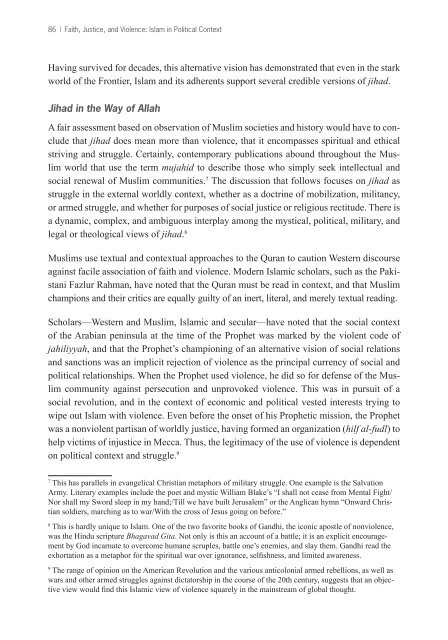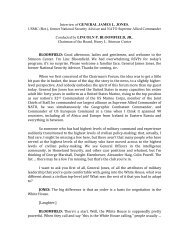Islam and Politics - The Stimson Center
Islam and Politics - The Stimson Center
Islam and Politics - The Stimson Center
You also want an ePaper? Increase the reach of your titles
YUMPU automatically turns print PDFs into web optimized ePapers that Google loves.
86 | Faith, Justice, <strong>and</strong> Violence: <strong>Islam</strong> in Political Context<br />
Having survived for decades, this alternative vision has demonstrated that even in the stark<br />
world of the Frontier, <strong>Islam</strong> <strong>and</strong> its adherents support several credible versions of jihad.<br />
Jihad in the Way of Allah<br />
A fair assessment based on observation of Muslim societies <strong>and</strong> history would have to conclude<br />
that jihad does mean more than violence, that it encompasses spiritual <strong>and</strong> ethical<br />
striving <strong>and</strong> struggle. Certainly, contemporary publications abound throughout the Muslim<br />
world that use the term mujahid to describe those who simply seek intellectual <strong>and</strong><br />
social renewal of Muslim communities. 7 <strong>The</strong> discussion that follows focuses on jihad as<br />
struggle in the external worldly context, whether as a doctrine of mobilization, militancy,<br />
or armed struggle, <strong>and</strong> whether for purposes of social justice or religious rectitude. <strong>The</strong>re is<br />
a dynamic, complex, <strong>and</strong> ambiguous interplay among the mystical, political, military, <strong>and</strong><br />
legal or theological views of jihad. 8<br />
Muslims use textual <strong>and</strong> contextual approaches to the Quran to caution Western discourse<br />
against facile association of faith <strong>and</strong> violence. Modern <strong>Islam</strong>ic scholars, such as the Pakistani<br />
Fazlur Rahman, have noted that the Quran must be read in context, <strong>and</strong> that Muslim<br />
champions <strong>and</strong> their critics are equally guilty of an inert, literal, <strong>and</strong> merely textual reading.<br />
Scholars—Western <strong>and</strong> Muslim, <strong>Islam</strong>ic <strong>and</strong> secular—have noted that the social context<br />
of the Arabian peninsula at the time of the Prophet was marked by the violent code of<br />
jahiliyyah, <strong>and</strong> that the Prophet’s championing of an alternative vision of social relations<br />
<strong>and</strong> sanctions was an implicit rejection of violence as the principal currency of social <strong>and</strong><br />
political relationships. When the Prophet used violence, he did so for defense of the Muslim<br />
community against persecution <strong>and</strong> unprovoked violence. This was in pursuit of a<br />
social revolution, <strong>and</strong> in the context of economic <strong>and</strong> political vested interests trying to<br />
wipe out <strong>Islam</strong> with violence. Even before the onset of his Prophetic mission, the Prophet<br />
was a nonviolent partisan of worldly justice, having formed an organization (hilf al-fudl) to<br />
help victims of injustice in Mecca. Thus, the legitimacy of the use of violence is dependent<br />
on political context <strong>and</strong> struggle. 9<br />
7<br />
This has parallels in evangelical Christian metaphors of military struggle. One example is the Salvation<br />
Army. Literary examples include the poet <strong>and</strong> mystic William Blake’s “I shall not cease from Mental Fight/<br />
Nor shall my Sword sleep in my h<strong>and</strong>;/Till we have built Jerusalem” or the Anglican hymn “Onward Christian<br />
soldiers, marching as to war/With the cross of Jesus going on before.”<br />
8<br />
This is hardly unique to <strong>Islam</strong>. One of the two favorite books of G<strong>and</strong>hi, the iconic apostle of nonviolence,<br />
was the Hindu scripture Bhagavad Gita. Not only is this an account of a battle; it is an explicit encouragement<br />
by God incarnate to overcome humane scruples, battle one’s enemies, <strong>and</strong> slay them. G<strong>and</strong>hi read the<br />
exhortation as a metaphor for the spiritual war over ignorance, selfishness, <strong>and</strong> limited awareness.<br />
9<br />
<strong>The</strong> range of opinion on the American Revolution <strong>and</strong> the various anticolonial armed rebellions, as well as<br />
wars <strong>and</strong> other armed struggles against dictatorship in the course of the 20th century, suggests that an objective<br />
view would find this <strong>Islam</strong>ic view of violence squarely in the mainstream of global thought.

















